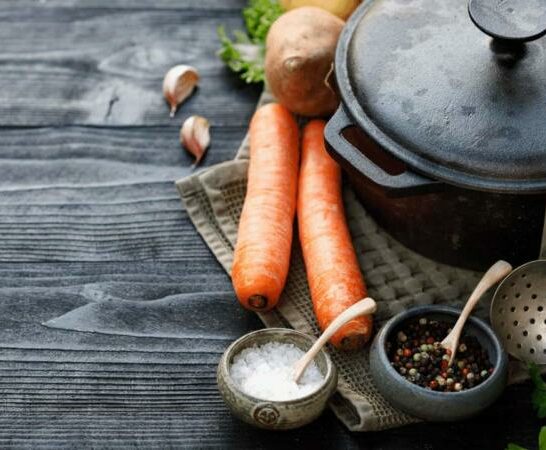Cast iron cookware is a great way to make food taste delicious and keep it warm.
However, you might be wondering if cast iron can also be used to store food in the refrigerator?
It would certainly make cooking a lot easier but it may not be the safest way to store your food.
Here are some factors that you should know before storing your food in cast iron for any extended period of time.
Can You Store Food in a Cast Iron?
Although it is not recommended to store food in a cast iron, you can do so for up to one day using safe practices. You shouldn’t store any acidic food in a cast iron to prevent corrosion and impurities from reaching your food. If the cast iron is enameled you may store food in it safely.
Factors for Storing Food in a Cast iron
Cast iron is not the ideal container for keeping foods safe for storage in your refrigerator.
There are several factors that affect food storage like the conduction of the material, the chemicals released from the cast iron, and the seasoning applied to the skillet.
The Heat of the Cast Iron
Cast irons are well-known for being great for cooking.
The metal can get extremely hot and is great at retaining heat which makes it perfect to use while cooking your food on the stovetop or oven.
There is no other plan that cooks your meals quite like a cast iron because the entire pan becomes the same temperature and evenly cooks your meals.
Storing your foods in a cast iron is tricky because even after you turn off your stove or oven, the skillet is still going to cook your foods due to the amount of time it takes to cool down.
This makes it even harder to store your foods properly without leaving them in the danger zone where bacteria grows.
If you throw a hot cast iron into your fridge you run the risk of plastic or glass the cast iron rests on breaking.
Impurities Entering Your Food
There’s a big chance you could have unsafe food to eat by storing it in a cast iron overnight.
Because your skillet is made with iron you could risk the chance of it leaching into your food, especially if your food is acidic.
Acidic food will eat away at the seasoning applied to your cast iron and it will get down into the actual iron, causing it to seep into your food.
Overexposure to iron is extremely dangerous and should be avoided. If you don’t leave acidic food you still run the risk of water corroding away at the cast iron.
Water won’t be enough to break down the iron and cause it to seep into your food but it will damage your cast iron over time.
The Cast Iron Seasoning
The seasoning coats your skillet so that there is a thin layer of protection that has several benefits when cooking.
For starters, it keeps your cast iron from rusting.
As your skillet comes into contact with moisture from cooking it will eat away at the iron and cause it to rust easily.
By throwing a small amount of olive oil in the skillet and rubbing it down with a napkin you can create a layer of protection.
You’ll have to bake the skillet a couple of times to really get the oil to coat your skillet.
The seasoning can also help prevent iron from leaching into your food and causing you to get sick.
Skillets that have been passed down for generations have a deep layer of seasoning that might even help the food taste better.
Foods to Avoid For Cast Iron Skillets
You want to make sure to avoid foods that are acidic to prevent them from corroding the seasoning and damaging your skillet.
Some examples of acidic foods include tomatoes, vinegar, lemon juice, or any other foods that have a high amount of acids in them which will cause damage over time.
You’ll also want to avoid any foods that have a distinct smell.
The smell might make its way into the seasoning and will give your cast iron an odd smell that might transfer to other meals.
Eggs and other really sticky items can be cooked on a cast iron, but you should give them some time before using them.
You want the seasoning on your skillet to build up pretty well or else the sticky foods will stick to your skillet and it will cause a huge mess.
Frequently Asked Questions About Can You Store Food in Cast Iron
Is cast iron toxic?
Cast iron may leech out excess iron into your food, causing it to become toxic. This only happens if the iron is not seasoned well or food is left too long in the cast iron after cooking. You may need to season your cast iron several times before it is ready to cook.
Is black residue on a cast iron bad for you?
The black residue is just part of cooking with cast iron and is not harmful to your body. The black seasoning coating should stick to the pan and not be easily rubbed off as it provides a thin cooking surface for the skillet.
Storing Food in a Cast Iron
It is not ideal to store any food in a cast iron for any extended period of time although you can get away with it up for a day without problems.
That’s if you do not add any acidic foods to the cast iron.

